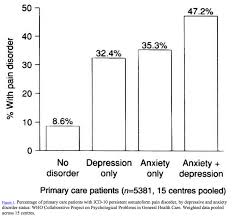There was a time when science & medicine failed to acknowledge the relationship between depression and pain. On a regular basis, clients report suffering from chronic pain. Occasionally people’s pain was accompanied by a diagnosis of depression but that would make up the minority of cases I’ve come across. That’s not to say that people aren’t suffering from depression, it just indicates that people (and their doctors) might not think the two events are related. I never really, rationally made that connection myself until I started seeing clients full time.
The first time the idea of a link really hit me was when I overhead a news story saying that doctors were successfully prescribing antidepressant medication to treat pain. I used that lens to observe our patient’s daily moods and how that correlated to their reporting of pain. It was an eye opening comparison to observe. Generally speaking, “bad days” at work or home tended to result in a greater magnitude of pain. Obviously, as an Exercise Physiologist, I am well aware of musculoskeletal issues that directly correlate to pain, like when someone sprains an ankle for example. But there was this clear link between those dull aches and and increase in life-related stressors.
Research evidence supports the practically observed phenomenon linking pain with depression. Although it is very difficult to conclude that pain causes depression or vice versa, there remains a clear relationship between the two conditions in that if you have depression you are more likely to experience chronic pain or the other way around.
The scientific reasoning connecting the two events involves a heightened sense of self-awareness in people suffering from depression or increased life stress. Researchers have also inferred that there is an amplification effect to symptoms shared between the two conditions. There is also evidence to suggest that experiencing one affects daily activities like mood and posture and eventually leading to a person experiencing both pain and depression.
There are many reasons to try and reduce stress, anxiety and negative hits to our mood. If you are suffering from chronic pain you may have to consider some ways to reduce the incidence of these instigators of depressive symptoms. It’s not easy to avoid being depressed or anxious, but there are often aggravators that can be avoided with some attention to detail. Here are some of our practical suggestions, but as always, seek advice specific to your case.
Take Pain & Depression Seriously – Don’t engage “superhero mode” and try to power through the symptoms of depression. When life gets hard, or your body is experiencing unusual pain, seek appropriate professional treatment.
Avoid High Stress Situations Where Possible – Although not entirely avoidable, be alert for situations that may negatively affect your mood and take measures to avoid them. Your body will thank you for your efforts.
Spend More Time Doing Things You Love – As demonstrated here, depression can lead to increased pain which can lead to more depression and it can turn into a vicious cycle. Ensure that through the day you give yourself time doing the things you love, even if its only for a short moment – then treasure those moments.
Prevent Physical Injury Through Regular Exercise – It’s possible that chronic pain & injury can lead to depression. Engaging in regular exercise and prehab can reduce the risk of physical injuries that result in pain. Exercise also has proven mood-boosting advantages.
REFERENCES
Korff, M. & Simon, G. (1996). The Relationship Between Pain and Depression. The British Journal Of Psychiatry, 168(30), 101-108.
